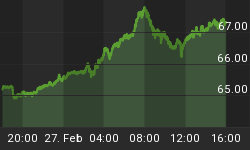
There has been a growing shift in favour of assets relative to bank deposits. This was initially encouraged by zero interest rates, but more recently there is little doubt that Cyprus's bail-in has accelerated the trend. This explains the bull markets in bonds and equities, which conveniently underwrites the entire banking system. It is however too early to offer evidence of falling deposit balances held by non-banks and the general public because depositors as a whole have been remarkably complacent, but there is ample evidence that liquidity from monetary expansion is inflating financial assets faster than bank deposits.
This helps explain why, for example, Italian 10-year bonds are on a 4% yield. The reason, doubtless reaffirmed by the Cyprus bail-in, is that investors with cash balances think over-priced sovereign debt is less risky than adding to their euro deposits. However, the central banks are relaxed because weakness in deposits at any single bank is easily covered through the banking system, insulating individual banks from depositor-withdrawal systems. Presumably, banking counterparties are also complacent because they can be reasonably sure to be exempt from any bail-ins. They have the comfort of knowing the banking system is underwritten by all those complacent enough to leave money on deposit beyond the insured level.
However, some of depositors' cash balances post-Cyprus will have gone into physical gold and silver, which explains why the bullion banks operating in the futures markets and the central banks behind them are so keen to dissuade us that gold and silver is a safe haven. I recently interviewed Ronnie Stoerferle, the Vienna-based analyst, who put his finger on it: since Cyprus, there has been a sharp rise in European demand for physical gold, with the pressure being felt by the bullion banks unable to deliver bullion.
At least one bank was recently reported to be only prepared to settle bullion liabilities in cash. Therefore the price knock-down in April was a logical response by the bullion banks, which had to defuse customer demand for physical delivery. But given that the driving factor was not speculation but a reluctance to add to deposits in the banking system, the jump in demand for bullion at lower prices was inevitable.
Where does this leave things? The crisis in bullion markets is worse than it was before. A good example of how little physical stock there is can be gained by tracking bullion deliveries on the Shanghai Gold Exchange. In the last few weeks they have dwindled to virtually nothing, having been a truncated 190 tonnes in April and 297 tonnes in March. Yet we know from reports that retail demand in China has taken off; so it is only a matter of time before prices are bid up on the Shanghai Gold Exchange enough to replace lost inventory.
It will be interesting to see how many more bullion banks are forced to admit the fiction behind their customer accounts in the coming weeks. For the moment the temporary solution amounts to rationing bullion supplies to the public.















